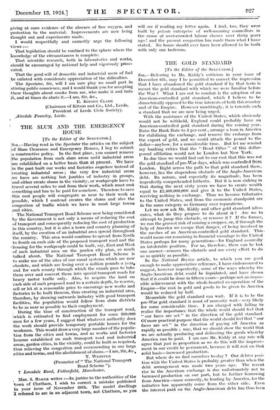THE SLUM AND THE EMERGENCY HOUSE [To the Editor of
the SPECTATOR.] Sm,—Having read in the Spectator the articles on the subject of Slum Clearance and Emergency Houses, I beg to submit a constructive policy. In the first place, you cannot remove the population from such slum areas until industrial areas are established on a better basis than at present. We have in the past built our works and factories anywhere instead of creating industrial areas ; the very few industrial areas we have are nothing but jumbles of industry in groups, and either create slums in the vicinity, or workpeople have to travel several miles to and from their work, which must cost something and has to be paid for somehow. Therefore to save this cost people will congregate as near to their work as possible, which I contend creates the slums and also the congestion of traffic which we have in most large towns land cities.
The National Transport Road Scheme now being considered Iby the Government is not only a means of reducing the cost of transport and consequently reducing the cost of production in this country, but it is also a town and country planning of itself, by the creation of an industrial area spread throughout the country. This area would continue to spread from North to South on each side of the proposed transport road and the
• housing for the workpeople could be built, say, East and West of such industrial area on the garden city plan, so much talked about. The National Transport Road Scheme is to make use of the sites of our canal systems which are now obsolete, and which arc losing over a million pounds a years and for each county through which the canals pass to take them over and convert them into special transport roads for heavy motor traffic only. Also, to acquire the land on each side of such proposed road to a certain depth, to reserve, sell or let at a reasonable price to encourage new works and factories to be built thereon, thus creating an industrial area, therefore, by drawing outwards industry with good transport facilities, the population would follow from slum districts to be as near as possible to their employment.
During the time of construction of the transport road, (which is estimated to find employment for some 500,000 men for a few years, I suggest that whatever authority does the work should provide temporary portable houses for the workmen. This would draw a very large number of the popula-
tion from the cities and towns, and as works and factories become established on such transport road and industrial areas, garden cities, in the vicinity, could be built as required, thus relieving the congestion and overcrowding in our large cities and towns, and the abolishment of slums.—I am, Sir, &c., T. WEBSTER
(Promoter of " The National Transport Road Scheme ").
7 Lonsdale. Road, Fallowfield, Manchester.
Mos. S. BARER writes :—In justice to the authorities of the town of Chatham, I wish to correct a mistake published in your issue of November 29th. The model dwellings referred to are in an adjacent town, not Chatham, as you will see if reading my letter again. I find, too, they were built by private enterprise of well-meaning councillors in the cause of over-crowded labour classes over thirty years ago and the present congestion has made them what I have stated. No house should ever have been allowed to be built with only one bedroom.


























































 Previous page
Previous page